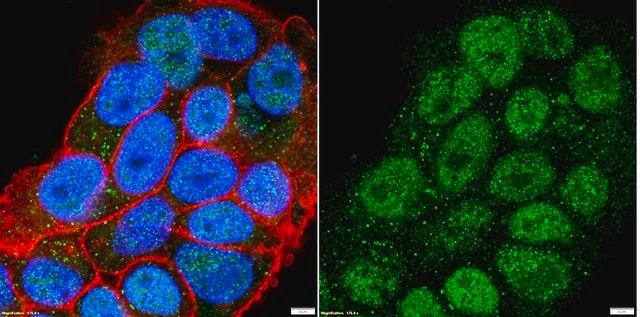04-820
Anti-Estrogen Receptor α Antibody, clone 60C, rabbit monoclonal
culture supernatant, clone 60C, from rabbit
Synonym(s):
Estradiol receptor, Nuclear receptor subfamily 3 group A member 1, estrogen receptor 1, estrogen receptor alpha, oestrogen receptor, steroid hormone receptor
About This Item
Recommended Products
biological source
rabbit
Quality Level
antibody form
culture supernatant
antibody product type
primary antibodies
clone
60C, monoclonal
species reactivity
rat, pig, mouse, human, bovine
packaging
antibody small pack of 25 μL
technique(s)
immunoprecipitation (IP): suitable
western blot: suitable
isotype
IgG
NCBI accession no.
UniProt accession no.
shipped in
dry ice
target post-translational modification
unmodified
Gene Information
bovine ... Esr1(407238)
human ... ESR1(2099)
mouse ... Esr1(13982)
pig ... Esr1(397435)
rat ... Esr1(24890)
General description
Specificity
Immunogen
Application
4-10 μL of a previous lot of this clone immunoprecipitated Estrogen Receptor α from 1 mg of MCF-7 RIPA lysate.
Epigenetics & Nuclear Function
Transcription Factors
Quality
Western Blot Analysis:
This lot detected ERα at a 1:2,000 dilution in MCF-7 lysates via SDS-PAGE and transferred to PVDF (Immobilon-P).
Target description
Linkage
Physical form
Storage and Stability
For maximum recovery of product, centrifuge the vial prior to removing the cap.
Disclaimer
Not finding the right product?
Try our Product Selector Tool.
Storage Class Code
10 - Combustible liquids
WGK
WGK 1
Certificates of Analysis (COA)
Search for Certificates of Analysis (COA) by entering the products Lot/Batch Number. Lot and Batch Numbers can be found on a product’s label following the words ‘Lot’ or ‘Batch’.
Already Own This Product?
Find documentation for the products that you have recently purchased in the Document Library.
Our team of scientists has experience in all areas of research including Life Science, Material Science, Chemical Synthesis, Chromatography, Analytical and many others.
Contact Technical Service








